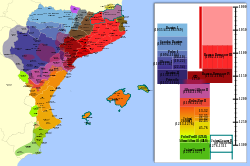County of Barcelona
| County of Barcelona | ||||||||||||||
| Comtat de Barcelona | ||||||||||||||
|
||||||||||||||
|
The county of Barcelona (red) in the context of peninsular expansion of the Crown of Aragon.
|
||||||||||||||
| Capital | Barcelona | |||||||||||||
| Languages | Catalan, Latin | |||||||||||||
| Religion | Roman Catholic | |||||||||||||
| Government | Feudal monarchy | |||||||||||||
| Count of Barcelona | ||||||||||||||
| • | 801–820 | Berà | ||||||||||||
| • | 1131–1162 | Ramon Berenguer IV | ||||||||||||
| Historical era | Middle Ages | |||||||||||||
| • | Established | 801 | ||||||||||||
| • | Disestablished | 1162 | ||||||||||||
|
||||||||||||||
| Today part of |
∟ |
|||||||||||||
The County of Barcelona was originally a frontier region under the rule of the Carolingian dynasty. By the end of the 10th century, the Counts of Barcelona were de facto independent, hereditary rulers in constant warfare with the Islamic caliphate of Córdoba and its successor states. The counts, through marriage alliances and treaties, acquired the other Catalan counties and extended their influence along Occitania. Barcelona formed the nucleus of the emergent Principality of Catalonia. In 1164, the count of Barcelona, Alfons I, inherited the Kingdom of Aragon (as Alfonso II). Thenceforward, the history of the county of Barcelona is subsumed within that of the Crown of Aragon, but the city of Barcelona remained preeminent within it.
Its origins date back to the early 8th century, when Muslims took control of the northern territories of the Visigothic Kingdom of Hispania and modern-day northeastern Spain and southern France. After turning back deep Muslim incursions, the Frankish Empire under the Carolingian monarchs, created the Marches of Gothia and Hispania progressively. This was achieved by taking over the territories of Septimania that the Moors invaded in the 8th century and from these, those territories surrounding the Pyrenees and specially the northeast of the Iberian Peninsula. These eastern Iberian territories were repopulated with people from the March of Gothia.
This resulted in the formation of an effective buffer zone between the Muslim Iberian peninsula and, the Duchy of Aquitaine and Provence.
...
Wikipedia

